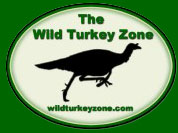|
I went out with one of my old turkey
hunting buddies and his brother-in-law,
who was a first-time turkey hunter. We
were all a little bit tired due to a couple
of early morning wake-ups and late night
socializing but we were persistent and
got out early to one of my regular hunting
locations. We had a good mile walk to
get back to the area we wanted to be in
and the weather was not really cooperating
this morning.
Kansas gets its name from the Indian
word "Kanza" meaning "People
of the South Wind" and this morning
was sure living up to its reputation.
The wind hadn't dropped below 20 mph all
night with some gusts much stronger than
that. We didn't really expect to hear
much off the roost but instead set up
in a relatively calm clearing along the
creek. It was very windy and my decoys
kept blowing around and the hen finally
blew over. I decided to get up and move
them since they did not look good. While
I was getting up, some birds finally flew
down to the east side of the clearing.
Of course they spooked since I was out
walking about. We sat there and called
for a little while more and then decided
to move along the creek bottom to try
and locate some gobblers.
The birds have been relatively quiet
this week. They have lost most of their
hens and the weather has been really cloudy
and humid all of the time. I don't think
we've hit our second gobbling peak when
the hens are all nesting although I'm
sure seeing lots of gobblers by themselves
early in the morning. I'm beginning to
think we won't really have the second
strong gobbling period just because the
weather has been really nasty during this
time.
We strolled along the creek, calling
every once in awhile to see if we could
get a response. We were coming close to
a clearing when we heard a gobble very
close. With the wind, I expected they
were within 100 yards and I knew we were
very close to an opening ahead. We crept
in a little closer through the trees and
I called on the paddle box. At least 2
birds gobbled back strong. We were kind
of in a bad position but we were in a
little washout gully by the creek which
did provide good cover. I did not think
we could move forward anymore since the
opening was right in front and the birds
seemed to be about 70 – 80 yards
away across the creek in the opening around
the corner of the trees we were in. In
hindsight, I wish we would have pulled
back a little ways from the clearing edge
and set up a little better.
Instead, we decided to set up right where
we were at and we put our first-time hunter
up above next to a tree to hopefully get
a shot. I also kind of got ready since
we thought there were 2 birds and I thought
maybe I could double up on a bird after
he shot.
I called several times and gave them
a little cutting also. They were fired-up
and started moving towards us. I thought
they would come out to the middle of the
opening that was about 50 yards across
and give us a shot at getting 2 birds.
When they came out, we saw there were
3 gobblers and we were hoping to get them
closer. The turkeys, however, didn’t
follow our plan very closely and they
came in through the trees on the far side
of the clearing. Our designated shooter
was screened off by some brush and couldn’t
get a shot. I really didn’t have
a shot either until they had circled around
some and started climbing the hill on
their way off. I could only see the lead
gobbler so I took the shot and dropped
the dominant bird that had been doing
most of the gobbling.
We tried to follow up and call the other
2 birds back in but they didn’t
seem very interested and we eventually
walked out. The gobbler was a nice 3 year-old
who had the most battle scars I've ever
seen on a bird. His breast had several
nasty spur wounds and bruises. He also
must have been hard at work breeding hens
since he had very little fat on his breast
sponge and he only weighed 19 pounds which
is light for a bird in this area.
The turkeys have apparently lost their
hens except for maybe a few of the hens
that got their nests burned out who are
re-nesting. This hunting area is in the
Flint Hills and the landowners typically
burn their pastures every year to keep
the cedar trees and brush from taking
over the grass. This is fine and the burning
seems to help the turkeys also but some
years they are a little late and the burning
does take out a lot of turkey nests.
|

